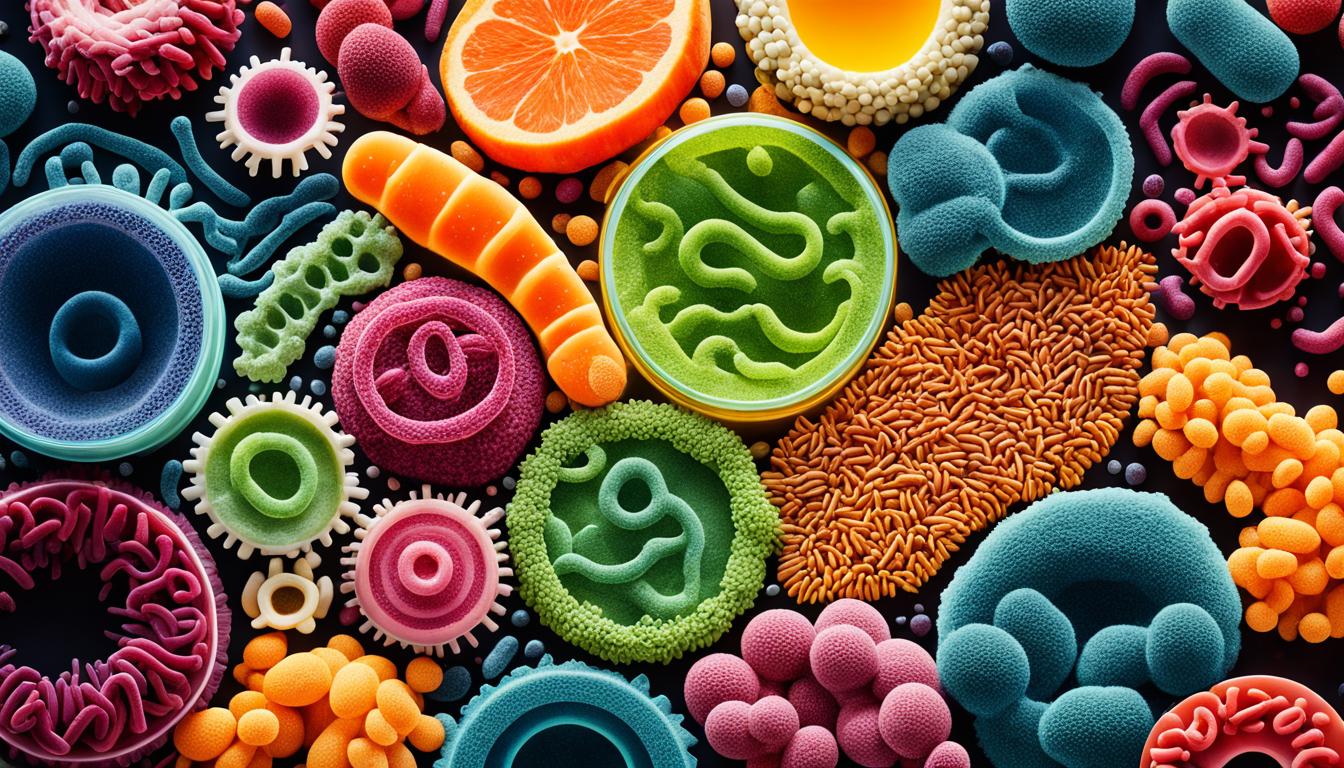Did you know the average human body has over 38 trillion gut bacteria? These tiny organisms are key to your health, helping with digestion and even your brain function. It’s important to understand gut bacteria, or the microbiome, for a healthy digestive system.
Key Takeaways
- The gut microbiome is made up of trillions of microbes, mostly bacteria, living in our intestines.
- Gut bacteria are crucial for digestion, immune health, and brain function.
- Keeping a healthy gut microbiome is key for good digestive health.
- Probiotics and fermented foods can support a balanced gut microbiome.
- Gut bacteria affect weight, heart health, blood sugar, and mental health.
What Is the Gut Microbiome?
The gut microbiome is filled with trillions of microorganisms, mostly bacteria, living in our intestines. These gut bacteria and other microbes are key to our health, outnumbering our own cells.
Trillions of Microbes in Your Intestines
Our gut houses a vast intestinal bacteria community, with more than 100 trillion microbes. Together, they form a vital part of our health, often called the “second brain” or a key gut microbiome.
More Bacterial Cells Than Human Cells
There are more bacterial cells in us than human cells. This shows how important gut diversity is for our health. The gut bacteria play a big role in keeping us well.
A Crucial Organ for Your Health
The gut microbiome is seen as a vital “organ” that impacts many body functions. It affects digestion, immune health, brain function, and even weight. Keeping a healthy balance of gut bacteria is key for our physical and mental health.
“The gut microbiome is the most important organ you’ve never heard of.”
How the Gut Microbiome Affects Your Body
The gut microbiome is full of trillions of microbes living in our intestines. It’s key to our health and well-being. These microbes help digest breast milk and fiber and control our immune system and brain health.
Digesting Breast Milk and Fiber
Certain gut bacteria, like Bifidobacteria, break down the sugars in breast milk. This makes it easier for our bodies to use the nutrients during infancy. They also help us get energy and nutrients from fiber. This turns fiber into short-chain fatty acids that feed the gut and support digestion.
Controlling the Immune System
The gut microbiome and the immune system work together closely. Gut bacteria talk to immune cells to keep our defenses in check. This helps shape our immune system and can affect our risk of allergies, autoimmune diseases, and infections.
Influencing Brain Health
Research shows the gut microbiome might also affect our brain health. Some gut bacteria make neurotransmitters like serotonin and dopamine, which help with mood and thinking. The gut and brain talk to each other, showing how the gut microbiome can impact our mental and neurological health.
| Gut Microbiome Functions | Impacts |
|---|---|
| Digesting breast milk and fiber | Nutrient absorption, gut health |
| Controlling the immune system | Regulating immune responses, susceptibility to diseases |
| Influencing brain health | Mental well-being, cognitive processes |
The gut microbiome’s wide range of effects on our body shows why keeping it balanced is crucial. By understanding its importance, we can support our gut health and overall well-being.
Gut Bactiria and Weight Gain
The link between gut bacteria and weight is now well-known. An imbalance in gut bacteria, called gut dysbiosis, can lead to weight gain and obesity.
Gut Dysbiosis and Obesity
Research shows that obese and non-obese twins have different gut microbiomes. This shows how important gut bacteria are for weight control. An unhealthy mix of gut bacteria, or gut dysbiosis, can cause inflammation and mess with metabolism. It can also affect how the gut talks to the brain, leading to weight gain.
Probiotics for Weight Loss
Probiotics can help with weight loss, but the effect is small. They add good bacteria to the gut, which is good for digestion and health. By adding these good bacteria, probiotics can improve digestion, help absorb nutrients better, and support a strong immune system. This can help keep a healthy weight.
| Gut Bacteria and Weight | Impact |
|---|---|
| Gut Dysbiosis | Can contribute to weight gain and obesity |
| Probiotics | May help restore a healthy gut microbiome and aid in weight control |
Learning about gut bacteria and weight can help people support a healthy gut. This can lead to better weight management.
Maintaining Gut Health
Keeping our gut microbiome healthy is key for good digestion. An imbalance can lead to issues like irritable bowel syndrome (IBS), causing bloating, cramps, and pain. Probiotics, such as Bifidobacteria and Lactobacilli, can fix gaps in the gut lining. This stops leaky gut syndrome, which is tied to many intestinal diseases.
Role in Irritable Bowel Syndrome (IBS)
An unhealthy gut microbiome plays a big part in IBS. Fixing the gut bacteria balance can ease symptoms like bloating, cramps, and irregular bowel movements.
- Bloating
- Abdominal cramps
- Diarrhea or constipation
Preventing Leaky Gut and Intestinal Diseases
For good gut health, we need a diverse balance. This helps avoid leaky gut syndrome, which is linked to intestinal diseases. Probiotics can make the gut lining stronger and lower inflammation. This supports better digestion.

“A healthy gut is the foundation for overall well-being. By keeping our gut microbiome in balance, we can prevent a host of digestive and immune-related issues.”
Gut Bactiria and Heart Health
Your gut microbiome is key to a healthy heart. Some gut bacteria boost “good” HDL cholesterol and manage triglyceride levels. Others can make TMAO, which may lead to artery plaque and heart disease risk.
Promoting Good Cholesterol and Triglycerides
A healthy gut microbiome can improve your cholesterol and triglyceride levels. Bacteria like Lactobacillus and Bifidobacterium increase HDL, or “good” cholesterol. This helps clear harmful LDL cholesterol from arteries. They also manage triglyceride levels, which is good for the heart.
TMAO and Artery-Blocking
Some gut bacteria make TMAO, linked to artery plaque. This can cause atherosclerosis, a big heart disease risk. Keeping a diverse gut microbiome is key to reducing TMAO and supporting heart health.
Probiotics for Lowering Cholesterol
- Probiotics with Lactobacilli can lower “bad” LDL cholesterol levels.
- They might also raise HDL cholesterol, which is good for the heart.
- Adding probiotics to your diet is a natural way to support heart health and a balanced gut.
The link between the gut and heart shows why gut health matters for heart health. A diverse gut microbiome helps with good cholesterol, triglyceride control, and may lower heart disease risk.
Controlling Blood Sugar and Diabetes Risk
The gut microbiome is a key player in keeping our blood sugar levels in check. It’s a complex mix of microbes living in our intestines. Research has uncovered how these gut bacteria affect our glucose levels.
Gut Microbiome Diversity and Type 1 Diabetes
Studies found that a drop in gut microbiome diversity can lead to type 1 diabetes in at-risk infants. This means the mix of gut bacteria might play a part in this autoimmune disease. Keeping a diverse and healthy gut could lower the risk of type 1 diabetes.
Blood Sugar Variations and Diet
People react differently to the same foods, showing how their gut microbiome affects blood sugar. This highlights the importance of understanding gut bacteria in glucose metabolism. Researchers aim to use this knowledge to manage blood sugar and lower type 2 diabetes risk.
| Gut Bacteria and Blood Sugar | Impact |
|---|---|
| Gut Microbiome Diversity | Associated with lower risk of type 1 diabetes |
| Individualized Blood Sugar Response | Gut bacteria composition may influence glucose regulation |
| Gut Bacteria and Diabetes Risk | Maintaining a healthy gut microbiome could help manage blood sugar and reduce diabetes risk |

In summary, the gut microbiome is vital for managing blood sugar and diabetes risk. By studying how gut bacteria and glucose metabolism interact, experts can find new ways to improve gut health. This could lead to better blood sugar control and less diabetes.
Gut Bactiria and Brain Health
Research is showing a strong link between our gut health and our brain. The trillions of microbes in our gut, known as the gut microbiome, affect our mental health and how we think. They play a big role in keeping our minds healthy.
Producing Brain Chemicals
Some gut bacteria can make neurotransmitters like serotonin. These are key for our mood and thinking. These chemicals can talk directly to our brain, changing how we feel and think.
Gut-Brain Connection
The gut and brain are connected by a network of nerves called the gut-brain axis. This lets the gut send signals to the brain. These signals can affect our brain health and behavior.
Probiotics for Mental Health
Studies show that some probiotics might help with depression, anxiety, and other mental issues. These good bacteria can make our gut healthier. This can also make our brain and emotions better.
Research on the gut-brain link shows how important a healthy gut microbiome is for us. By keeping our gut bacteria diverse and balanced, we can support our physical, mental, and cognitive health.
“The gut-brain connection is a powerful and fascinating area of research, with the potential to transform how we approach mental health and overall well-being.”
Conclusion
The gut microbiome is key to our health, affecting digestion, immune function, and more. It also helps with heart health, blood sugar, and brain function. By focusing on gut bacteria, we can gain many health benefits and improve our well-being.
Eating foods high in fiber and fermented items can boost our gut bacteria. Adding probiotics might also help. This supports better digestion, a strong immune system, and more.
Looking after our gut microbiome is a big step towards better health. It helps us digest food well, keeps our immune system strong, and even affects our mood. By taking care of our gut, we can live a healthier and happier life.
FAQ
What is the gut microbiome?
The gut microbiome is made up of trillions of microorganisms, mostly bacteria, living in our intestines. These microbes act like an extra organ, playing a big role in our health.
How does the gut microbiome affect the body?
It helps with digesting breast milk and fiber, controls the immune system, and affects brain health. It talks to immune cells and might touch the central nervous system too.
How can gut bacteria contribute to weight gain and obesity?
When the balance of gut bacteria is off, it can lead to weight gain and obesity. Research shows that obese and non-obese twins have different gut microbiomes, showing its impact on weight.
How can the gut microbiome impact gut health?
An imbalance in gut bacteria can cause irritable bowel syndrome (IBS), leading to bloating, cramps, and pain. Certain probiotics can fix gaps in the gut lining, preventing leaky gut syndrome and related diseases.
How does the gut microbiome affect heart health?
Some gut bacteria help with “good” HDL cholesterol and triglycerides. Others can increase the risk of heart disease by making trimethylamine N-oxide (TMAO). Probiotics with Lactobacilli can lower cholesterol and help heart health.
How can the gut microbiome impact blood sugar and diabetes risk?
A drop in gut microbiome diversity can signal type 1 diabetes in at-risk infants. The gut microbiome’s makeup affects blood sugar levels. Keeping a diverse, healthy gut microbiome is key for managing blood sugar and diabetes risk.
How does the gut microbiome affect brain health?
Some gut bacteria make neurotransmitters like serotonin, which affects mood and thinking. The gut and brain are connected by nerves, letting the gut microbiome talk to the brain. Studies link gut imbalance to mental health issues. Some probiotics may help with depression and other mental conditions.




